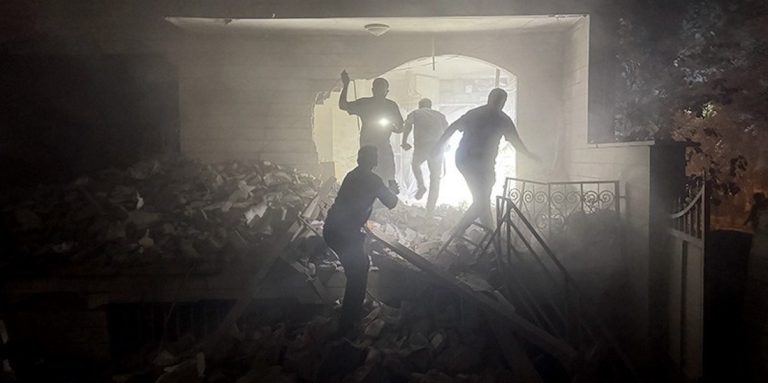
Dozens of Civilian Buildings Destroyed, Hundreds Dead as Iran Vows to Rebuild and Retaliate
New York, N.Y. – In a dramatic escalation of hostilities, Israel launched a series of airstrikes on residential neighborhoods in Tehran on June 13, 2025, marking the most intense assault on the Iranian capital since the Iran-Iraq war of the 1980s.
The attacks, which Israeli officials say targeted military and nuclear infrastructure, have left hundreds dead, thousands wounded, and entire communities in ruins, sparking international alarm and calls for urgent diplomacy.
Civilian Toll Mounts Amid Precision Strikes
The Israeli Air Force’s surprise campaign struck deep into Tehran and other Iranian cities, targeting what Israel described as nuclear and military sites.

However, the reality on the ground has been catastrophic for civilians.
Iranian health officials report that more than 400 people have been killed and over 3,000 wounded in the capital alone, with many casualties resulting from missile and drone strikes on residential buildings.
Human rights groups estimate the nationwide death toll at over 600, with at least 1,300 injured as of June 18.
Tehran’s mayor described scenes of “utter devastation” in several districts, where apartment blocks collapsed and emergency crews worked around the clock to rescue survivors from the rubble. The attacks have displaced thousands, leaving families without homes or basic services as summer heat intensifies.
Military Objectives and Civilian Consequences
According to Israeli officials, the strikes were designed to neutralize Iran’s nuclear enrichment program and eliminate key figures in its military and scientific leadership.

Over 30 senior Iranian security chiefs and 11 nuclear scientists were reportedly killed in the initial wave of attacks, which also targeted air defense systems and missile manufacturing facilities.
Israel claims these operations have set back Iran’s nuclear ambitions by years, effectively “removing the existential threat” posed by a potential Iranian nuclear weapon.
Yet, the precision of these strikes has been called into question. Iranian authorities and independent monitors say civilian infrastructure, including schools and hospitals, suffered significant damage, raising concerns about the proportionality and legality of the attacks under international law.
Internet restrictions and arrests for dissent have further complicated efforts to document the full extent of the devastation.
Regional and Global Repercussions
The conflict has sent shockwaves through the Middle East and beyond.

Iran’s response included missile barrages against Israeli cities and military sites, though damage in Israel was limited compared to the destruction in Tehran.
The Houthis in Yemen and Iraqi militias launched their own attacks in solidarity with Iran, but these were largely contained.
World leaders have scrambled to prevent further escalation.
The U.N. Security Council convened emergency meetings, while European and Turkish officials have urged renewed diplomacy to revive nuclear negotiations.
The United States, after initially defending Israel, conducted its own strikes on Iranian nuclear sites before brokering a fragile ceasefire. Despite these efforts, both Israel and Iran remain on high alert, with military and political leaders warning that the threat of renewed conflict persists
Geopolitical Implications and the Future of Nuclear Diplomacy
The war’s impact extends far beyond Iran and Israel. Analysts warn that the normalization of preemptive airstrikes and the failure of non-nuclear states to deter aggression may accelerate nuclear proliferation worldwide.
The destruction in Tehran has underscored the vulnerability of countries without a
nuclear deterrent, prompting renewed debate in capitals from New Delhi to Islamabad.
Meanwhile, the path to renewed nuclear talks remains fraught. The U.S. is preparing to present Iran with tough demands, including a total ban on uranium enrichment and strict limits on missile production, in exchange for sanctions relief and international investment. Iranian leaders, however, have dismissed these proposals as unrealistic, insisting that their nuclear and missile programs are non-negotiable.
Humanitarian Crisis and the Road Ahead

As the dust settles, Tehran faces a long and difficult recovery.
Emergency services are stretched thin, and the risk of disease and displacement looms large.
International aid organizations have called for immediate humanitarian assistance and unfettered access to affected areas.
For many Iranians, the attacks have revived memories of past wars and deepened mistrust of foreign intervention.
Yet, amid the rubble, there are also calls for unity and resilience.
“We have survived worse,” said one Tehran resident. “We will rebuild, but we will not forget.”
#IsraelIranConflict #TehranAirstrikes #MiddleEastTensions #NuclearDiplomacy #HumanitarianCrisis
Tags: Israel, Iran, Tehran, airstrikes, nuclear program, Middle East,
humanitarian crisis, diplomacy, U.N., conflict, civilian casualties
Audio Summary (75 words)
Israel’s June 13, 2025, airstrikes on Tehran have devastated residential neighborhoods, killing hundreds and injuring thousands. The Israeli government claims the attacks aimed to cripple Iran’s nuclear and military capabilities, but civilian casualties and widespread destruction have drawn global condemnation. As Iran mourns its losses and vows to rebuild, world leaders are pushing for renewed nuclear talks and de-escalation. The conflict marks a turning point in Middle East geopolitics, with far-reaching implications for regional and global security.